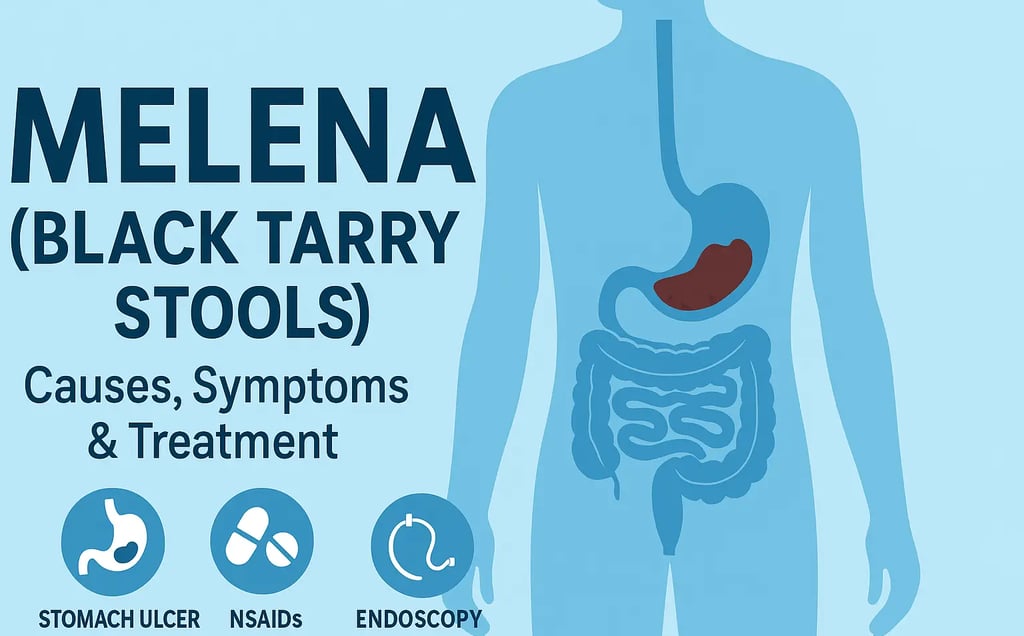Melena: Causes, Symptoms, Diagnosis, and Treatment of Black Tarry Stools
Learn about melena, the condition marked by black, tarry stools caused by upper gastrointestinal bleeding. Explore its causes, symptoms, diagnosis, and treatment options.


What is Melena?
Melena refers to the passage of black, tarry stools, often caused by upper gastrointestinal bleeding. This condition is different from stool discoloration due to food or medications. The dark appearance results from the oxidation of iron in blood hemoglobin as it passes through the digestive tract. Combined with bacterial breakdown, this creates the tar-like consistency that makes melena a warning sign of serious health issues.
Melena usually originates from bleeding in the esophagus, stomach, or small intestine. Unlike hematochezia (bright red blood in stool indicating lower GI bleeding), melena suggests that blood has undergone chemical changes, making the stool dark and sticky. Because melena may point to ulcers, varices, or gastrointestinal cancers, recognizing and treating it promptly is crucial.
While some cases may be linked to iron supplements, black licorice, or certain foods, black stools should always be taken seriously. If melena is suspected, immediate medical evaluation is necessary to prevent complications.
Common Causes of Melena
Melena can arise from several conditions, most related to gastrointestinal bleeding. Common causes include:
Peptic Ulcers – Ulcers in the stomach or duodenum, often aggravated by NSAIDs or excess stomach acid, are a leading cause.
Liver Disease and Varices – Cirrhosis can lead to esophageal varices, which may rupture and cause heavy bleeding.
Medications – Long-term use of NSAIDs, corticosteroids, or anticoagulants can trigger bleeding.
Dietary Factors – Black licorice, iron supplements, and certain foods can mimic melena without actual bleeding.
Other GI Conditions – Diverticulosis, tumors, and malignancies may also present with melena.
Because melena can indicate a medical emergency, any instance of black tarry stools warrants prompt medical attention.
Symptoms Associated with Melena
In addition to black, sticky stools, patients may also experience:
Abdominal pain or cramping
Dizziness or fainting (due to blood loss)
Fatigue and weakness
Vomiting blood (hematemesis)
Pale skin, indicating anemia
These symptoms help differentiate melena from harmless stool discoloration.
Diagnosing Melena
Diagnosis involves a combination of medical history, examination, and specialized tests:
Medical history review – Doctors ask about recent symptoms, medications, and diet.
Physical exam – Checking for signs of anemia or abdominal tenderness.
Endoscopy – Direct visualization of the digestive tract to locate bleeding sources such as ulcers or varices.
Stool tests – Detect blood or pathogens in stool samples.
Imaging scans – Ultrasound or CT scans may be used for deeper evaluation if tumors or obstructions are suspected.
Timely diagnosis is key to preventing serious complications.
Treatment Options for Melena
Treatment focuses on stabilizing the patient and addressing the underlying cause of bleeding:
Medical Management
IV fluids and blood transfusions (if severe blood loss).
Proton pump inhibitors (PPIs) to reduce stomach acid and allow healing.
Endoscopic Treatment
Cauterization, clipping, or band ligation of bleeding vessels.
Surgical Interventions
Required if endoscopic treatment fails or if tumors/structural issues are present.
Lifestyle Modifications
Avoid alcohol, smoking, and NSAIDs.
Maintain a fiber-rich diet for digestive health.
Regular follow-ups to monitor for recurrence.
Final Thoughts
Melena (black tarry stools) is a serious health warning sign that often indicates upper gastrointestinal bleeding. Whether caused by peptic ulcers, varices, or medications, melena requires immediate diagnosis and treatment. Ignoring this symptom can lead to severe complications, making medical evaluation crucial for long-term health.
